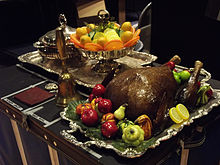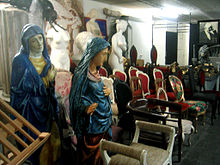- Theatrical property
-
A theatrical property, commonly referred to as a prop, is an object used on stage by actors to further the plot or story line of a theatrical production. Smaller props are referred to as "hand props". Larger props may also be set decoration, such as a chair or table. The difference between a set decoration and a prop is use. If the item is not touched by a performer for any reason it is simply a set decoration. If it is touched by the actor in accordance to script requirements or as deemed by the director, it is a prop.
Contents
History
Small acting troupes formed during the renaissance, travelled throughout Europe. These "companies," functioning as cooperatives, pooled resources and divided any income. Many performers provided their own costumes, but special items: stage weapons, furniture or other hand-held devices were considered "company property," thus the term "property," which eventually was shortened to "prop."[1][2] The first known props were stylized hand held masks, called Onkoi, used by performers in "Greek Theatre" and have become symbols of theatre today, known as the "comedy and tragedy masks".
On stage, backstage
The term "theatrical property" originated to describe an object used in a stage play and similar entertainments to further the action. Technically, a prop is any object that gives the scenery, actors, or performance space specific period, place, or character. The term comes from live-performance practice, especially theatrical methods, but its modern use extends beyond the traditional plays and musical, circus, novelty, comedy, and even public-speaking performances, to film, television, and electronic media.
Props in a production originate from off stage unless they have been preset on the stage before the production begins. Props are stored on a prop table backstage near the actor's entrance during production then generally locked in a storage area between performances. The person in charge of handling the props is generally called the props "master/mistress" however, varying positions also include coordinators, production assistance and interns as may be needed for a specific project.
Modern usage
The term has readily transferred to television and motion picture production, where they are commonly referred to by the phrase movie prop or film prop. In recent years, the increasing popularity of movie memorabilia (a broader term that also includes costumes) has added new meaning to the term "prop," broadening its existence to include a valuable after-life as a prized collector's item. Typically not available until after a film's premiere, movie props appearing on-screen are christened "screen-used", and can fetch thousands of dollars in online auctions and charity benefits.[3][4]
Many props are ordinary objects. However, a prop must "read well" from the house or on-screen, meaning it must look real to the audience. Many real objects are poorly adapted to the task of looking like themselves to an audience, due to their size, durability, or color under bright lights, so some props are specially designed to look more like the actual item than the real object would look. In some cases, a prop is designed to behave differently than the real object would, often for the sake of safety.
Examples of special props are:
- A prop sack representing a burlap bag, might have another black fabric bag sewn, discreetly inside the burlap, giving it strength, hiding the contents and creating a visual void to the audience view.
- A prop weapon (such as a stage gun or a stage sword) that reads well but lacks the intentional harmfulness of the corresponding real weapon. In the theater, prop weapons are almost always either non-operable replicas, or have safety features to ensure they are not dangerous. Guns fire caps or noisy blanks, swords are dulled, and knives are often made of plastic or rubber. In film production, fully functional weapons are mostly used, but typically only with special smoke blanks with blank adapted guns instead of real bullets. Real cartridges with bullets removed are still dangerously charged which has caused several tragic instances when used on stage or film. The safety and proper handling of real weapons used as movie props is the premiere responsibility of the prop master,. ATF and other law enforcement agencies may monitor the use of real guns for film and television but this is generally not necessary with stage props as these guns are permanently "plugged".
- Breakaway objects, or stunt props, such as balsa-wood furniture, or sugar glass (mock-glassware made of crystallized sugar) whose breakage and debris look real but rarely cause injury due to their light weight and weak structure. Even for such seemingly safe props, very often a stunt double will replace the main actor for shots involving use of breakaway props. Rubber bladed-weapons and guns are examples of props used by stuntmen to minimize injury, or by actors where the action requires a prop which minimizes injury.[5]
- Hero props are the more detailed pieces that a main character would carry in film and television. The term may sometimes be used in stage production as many props from film find their way into theatre from common rental and purchase shops.
Design, construct and acquire
Working in coordination with the set designer, costume designer, lighting and sometimes, sound designer, this overlapping position has only in recent years become of greater importance. Props have become more and more specialized due in large part to realism as well as the rise of theatre in the round, where few sets are used and the simple prop becomes as important a design element as costumes and lighting.
Besides the obvious artistic creations made in the prop workshop, much of the work done by the property designer is research, phone searches, and general footwork in finding needed items.
Of all the positions within theatre and film, the property designer may well receive the least accolades. There are no awards for props and credit may sometimes not be listed.
See also
References
- ^ Eric Partridge Origins: A Short Etymological Dictionary of Modern English: Second Edition. Random House 1959
- ^ Kenneth Macgowan and William Melnitz The Living Stage. Prentice-Hall 1955.
- ^ Ian Mohr Daily Variety. Reed Business Information, February 27, 2006 "Movie props on the block: Mouse to auction Miramax leftovers"
- ^ David James, People Magazine, Time, Inc. February 24, 2007 "Bid on Dreamgirls Costumes for Charity"
- ^ Coyle, Richard. "A Collector's Guide To Hand Props". RACprops. http://www.racprops.com/issue3/editorial/. Retrieved 9 July 2009.
Further reading
- Sofer, Andrew (2003). The Stage Life of Props (illust. ed.). University of Michigan Press. ISBN 0-472-06839-3. http://books.google.ca/books?id=tc9x7eS23vsC. Retrieved 2009-01-30.
External links
- Props by IDM. Fake electronic prop manufacturer
- The Society Of Prop Artisan Managers
Stagecraft Theatrical scenery
(Scene shop)FieldsHardwareStage lighting FieldsHardwareBarn doors · Color gel · Color scroller · Cyclorama · Gobo · Lighting control console · Stage pin connector · Top hat · Theatrical fogBeam projector · Ellipsoidal reflector spotlight · Fresnel lantern · Intelligent lighting · Parabolic aluminized reflector light · Scoop · Striplight · AccessoriesOther Fields Categories:- Stagecraft
- Prop design
Wikimedia Foundation. 2010.


